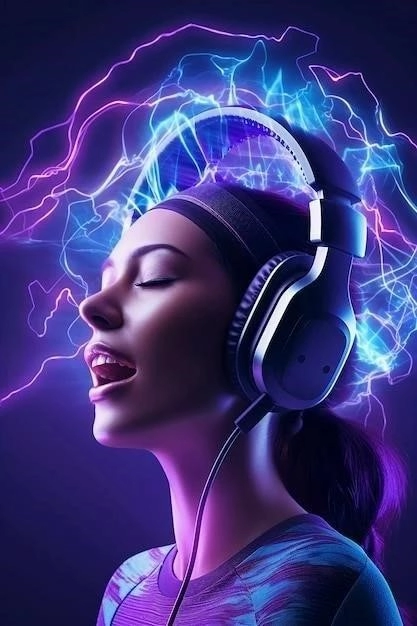Music, a universal language that transcends cultural boundaries, possesses an uncanny ability to evoke profound emotions, alter our mood, and even influence our cognitive processes․ For centuries, philosophers and artists have pondered the enigmatic relationship between music and the human psyche․ Today, neuroscience is beginning to unravel the intricate neural mechanisms underlying our experience of music and its profound effects on our brains․

The Brain on Music: A Symphony of Neural Activity
Listening to music is a complex cognitive task that engages numerous brain regions, each contributing to the overall experience․ When we hear music, sound waves are transformed into electrical signals by our ears and transmitted to the auditory cortex, located in the temporal lobe․ Here, the brain decodes the fundamental elements of music, such as pitch, rhythm, and timbre․
However, the processing of music extends far beyond the auditory cortex, involving a complex interplay of brain regions:
- Amygdala: This almond-shaped structure, nestled deep within the brain, plays a crucial role in processing emotions․ Music, particularly its emotional tone, can activate the amygdala, triggering physiological responses such as changes in heart rate, respiration, and even goosebumps․
- Hippocampus: Known for its involvement in memory formation, the hippocampus is also engaged during music listening․ Familiar melodies can evoke vivid memories, highlighting the powerful link between music and autobiographical experiences․
- Nucleus Accumbens: Located in the reward pathway of the brain, the nucleus accumbens releases dopamine, a neurotransmitter associated with pleasure and motivation․ Upbeat and pleasurable music can trigger dopamine release, explaining why we find certain songs so rewarding and enjoyable․
- Prefrontal Cortex: This executive center of the brain, responsible for higher-order cognitive functions such as planning and decision-making, is also involved in music processing․ The prefrontal cortex helps us interpret the emotional content of music and integrate it with our personal experiences․
The Emotional Power of Music: A Symphony of Feelings
Music possesses an unparalleled ability to evoke a wide range of emotions, from joy and elation to sadness and nostalgia․ This emotional power stems from the brains intricate wiring, where music processing overlaps with regions involved in emotion, memory, and reward․
Specific musical elements can elicit distinct emotional responses:
- Tempo and Rhythm: Fast tempos and driving rhythms tend to evoke feelings of excitement, energy, and joy, while slower tempos and more relaxed rhythms can induce calmness, relaxation, or even sadness․
- Melody: Ascending melodies often convey happiness and hope, while descending melodies can evoke sadness or melancholy․ The use of major and minor keys also plays a crucial role, with major keys generally associated with positive emotions and minor keys with negative emotions․
- Harmony: Consonant harmonies, characterized by stable and pleasing combinations of notes, tend to evoke feelings of peace and tranquility, while dissonant harmonies, with their clashing and unstable combinations, can create tension, anxiety, or even excitement․

Music and the Brain: Implications for Health and Well-being
The profound effects of music on our brains have significant implications for our overall health and well-being․ Music therapy, a growing field, harnesses the power of music to address a wide range of physical, emotional, and cognitive needs․
Here are some ways music can benefit our health:
- Stress Reduction: Listening to calming music can lower cortisol levels, the bodys primary stress hormone, promoting relaxation and reducing anxiety․
- Pain Management: Music can serve as a powerful distraction from pain, reducing the perception of discomfort and improving pain tolerance․
- Mood Enhancement: Upbeat music can elevate mood, increase energy levels, and even alleviate symptoms of depression․
- Cognitive Enhancement: Listening to music, particularly classical music, has been shown to improve focus, attention, and memory․
- Social Bonding: Music plays a fundamental role in social bonding, fostering a sense of community and belonging through shared musical experiences․
Conclusion: The Enduring Power of Music
Music, an integral part of the human experience, holds a unique power over our brains and emotions․ From evoking profound emotions to influencing cognitive processes, musics impact is undeniable․ As neuroscience continues to unravel the complexities of the brain on music, we gain a deeper understanding of how melodies shape our inner world․ Whether its the joy of a catchy tune or the solace of a melancholic melody, musics enduring power lies in its ability to touch the very core of our being․

Music as a Therapeutic Tool: Beyond Pleasure and Entertainment
While the emotional impact of music is undeniable, its therapeutic potential extends far beyond mere mood regulation․ Music-based interventions (MBIs) are gaining increasing recognition in clinical settings, showcasing promising results in the treatment of various neurological and psychological conditions․
Neurological Rehabilitation: Re-harmonizing the Injured Brain
MBIs have demonstrated remarkable efficacy in neurological rehabilitation, particularly for individuals recovering from stroke, traumatic brain injury, or neurodegenerative disorders like Parkinsons disease․ Music therapy, when tailored to specific therapeutic goals, can:
- Improve Motor Function: Rhythmic auditory stimulation, a technique using music with a consistent beat, can facilitate gait training and improve coordination in patients with motor impairments․
- Enhance Speech and Language Skills: Melodic intonation therapy utilizes melodic patterns to help patients with aphasia (loss of speech) regain their ability to communicate․
- Stimulate Cognitive Function: Music listening and active music-making can enhance attention, memory, and executive function, potentially slowing cognitive decline in dementia patients․
Mental Health Applications: Finding Solace in Sound
The therapeutic power of music extends to the realm of mental health, offering valuable tools for managing conditions such as anxiety, depression, and post-traumatic stress disorder (PTSD):
- Anxiety Reduction: Listening to calming music can induce a relaxation response, lowering heart rate, blood pressure, and stress hormones, thus alleviating anxiety symptoms․
- Mood Regulation: Music therapy, incorporating elements of songwriting, improvisation, and active listening, can provide a safe space for emotional expression and processing, aiding in mood regulation and self-awareness․
- Trauma Processing: Music can serve as a powerful tool for processing trauma, allowing individuals with PTSD to access and express difficult emotions in a non-threatening manner․
Future Directions: Exploring the Uncharted Territories of Music and the Brain
The burgeoning field of music neuroscience continues to unveil the fascinating interplay between music and the human brain․ Future research endeavors aim to:
- Delve deeper into the neural mechanisms underlying musics therapeutic effects, paving the way for more targeted and effective interventions․
- Explore the potential of music technology in delivering personalized and accessible music-based therapies․
- Investigate the role of cultural influences on music perception and its therapeutic applications across diverse populations․
As we continue to explore the profound influence of music on our brains, we unlock new possibilities for harnessing its therapeutic potential to enhance human health and well-being․ Music, with its universal appeal and profound impact, holds immense promise as a powerful tool for healing, growth, and transformation․
Beyond the Clinic: Musics Wider Impact and Future Potential
While music therapy garners increasing clinical validation, the impact of music extends far beyond formalized therapeutic settings․ Understanding these broader applications, and the underlying neuroscientific mechanisms, is crucial for harnessing musics full potential․
Music and Education: A Symphony of Learning
The intersection of music and education is a fertile ground for research․ Early musical training has been linked to enhanced cognitive abilities in children, including improvements in language development, spatial reasoning, and working memory․ These benefits are thought to stem from musics ability to:
- Strengthen auditory processing: Music training sharpens the brains ability to discriminate and process complex auditory information, skills crucial for language acquisition and literacy․
- Boost neuroplasticity: Engaging in musical activities, particularly during critical periods of brain development, can promote structural and functional changes in the brain, enhancing its capacity for learning․
- Foster executive function: Music performance, requiring attentional control, working memory, and cognitive flexibility, can strengthen executive functions essential for academic success and beyond․
Music and Social Cohesion: Harmonizing Human Connection
Music transcends cultural boundaries, serving as a powerful catalyst for social bonding and empathy․ Shared musical experiences, whether attending a concert or singing in a choir, can:
- Release oxytocin: Known as the “bonding hormone,” oxytocin is released during pleasurable social interactions, including shared musical experiences, strengthening social connections and fostering trust․
- Synchronize brain activity: Group music-making, requiring precise coordination and shared intention, leads to synchronized brainwave patterns among participants, enhancing feelings of connection and empathy․
- Promote prosocial behavior: Music has been shown to increase altruism and cooperation, suggesting its potential to foster positive social interactions and community building․
Unlocking Musics Potential: A Harmonious Future
As our understanding of the brain-music nexus deepens, so too do the possibilities for harnessing musics power to enhance human lives․ Key areas for future exploration include:
- Personalized Music Interventions: Developing tailored music-based therapies based on individual brain responses and preferences, maximizing their efficacy and accessibility․
- Technological Advancements: Leveraging emerging technologies, such as artificial intelligence and neuroimaging, to refine our understanding of musics effects on the brain and create innovative therapeutic tools․
- Cross-Cultural Research: Expanding research beyond Western musical traditions to encompass diverse cultures and musical genres, gaining a more holistic understanding of musics universal and culturally specific effects․
The exploration of musics impact on the brain is a symphony still in progress, each new discovery revealing another layer of its profound influence on our thoughts, emotions, and behaviors․ By embracing interdisciplinary collaboration and innovative research, we can unlock musics full potential to heal, educate, and unite humanity in a harmonious future․
Beyond the Notes: Musics Potential in Health, Education, and Society
While the preceding sections delved into the established benefits and future directions of music therapy and the neuroscience of music, it is crucial to acknowledge that musics impact extends far beyond the confines of clinical settings․ This section will explore the broader implications of musics influence on human health, education, and social cohesion, highlighting key areas for future research and development․
Music and Technology: A Harmonious Convergence for Enhanced Well-being
The rapid advancement of technology has ushered in a new era for music, creating unprecedented opportunities to harness its therapeutic and educational potential․
- Personalized Music Interventions: Digital platforms and artificial intelligence algorithms can now analyze individual listening habits, physiological responses, and therapeutic goals to curate personalized music experiences․ This level of customization can enhance the effectiveness of music therapy for various conditions, including anxiety, depression, and pain management․
- Virtual Reality and Music Therapy: Immersive virtual reality environments, paired with carefully selected music, can create powerful therapeutic experiences․ For instance, VR can be used to simulate real-life scenarios that trigger anxiety, allowing individuals to practice coping mechanisms within a safe and controlled setting, while music modulates emotional responses and enhances relaxation․
- Biofeedback and Neurofeedback: Integrating biofeedback and neurofeedback technologies with music listening or performance allows individuals to monitor and modulate their physiological responses in real-time․ This can facilitate self-regulation techniques for stress reduction, emotional control, and even motor rehabilitation․
Music Education: Cultivating Cognitive and Social Skills for a Changing World
Music education, far from being an extracurricular luxury, plays a vital role in fostering cognitive, social-emotional, and creative skills essential for 21st-century learners․
- Executive Function and Cognitive Flexibility: Music training, particularly instrumental music, requires sustained attention, working memory, and the ability to switch between tasks efficiently․ These demands strengthen executive functions, transferable skills crucial for academic success, problem-solving, and adaptability in a rapidly changing world․
- Empathy and Social Cohesion: Group music-making, whether in a choir, orchestra, or band, cultivates empathy, cooperation, and a shared sense of purpose․ The act of synchronizing with others, listening attentively, and working towards a common goal fosters social-emotional intelligence and a sense of belonging, essential qualities for building inclusive and harmonious communities․
- Creativity and Innovation: Music education nurtures creativity, critical thinking, and problem-solving skills․ Engaging with music, whether through composition, improvisation, or active listening, encourages divergent thinking, experimentation, and the ability to express oneself in unique and meaningful ways, essential skills for innovation and adaptability in any field․
Music and Cultural Understanding: Bridging Divides, Fostering Empathy
Music, often referred to as the universal language, possesses a unique ability to transcend cultural boundaries, fostering empathy, and promoting cross-cultural understanding․
- Exposure to Diverse Musical Traditions: Engaging with music from different cultures broadens perspectives, challenges preconceived notions, and fosters appreciation for the richness and diversity of human expression․ This exposure can be facilitated through ethnomusicology programs, world music ensembles, and cross-cultural musical collaborations․
- Music as a Tool for Social Change: Throughout history, music has served as a powerful tool for social commentary, protest, and activism․ From freedom songs to anti-war anthems, music can unite people around shared values, raise awareness of social injustices, and inspire collective action for positive change․
- Music Diplomacy: Music possesses a unique diplomatic power, fostering communication and understanding between nations and cultures․ International music exchange programs, collaborative performances, and cultural festivals can bridge divides, promote peacebuilding efforts, and foster mutual respect through the shared language of music․
A Harmonious Future: Embracing Musics Transformative Power
As our understanding of musics profound effects on the brain continues to evolve, we stand at the precipice of a new era, where musics potential to heal, educate, and unite humanity can be fully realized․
By embracing interdisciplinary research, fostering technological innovation, and advocating for robust music education programs, we can unlock musics transformative power to create a more harmonious and compassionate world for generations to come․










